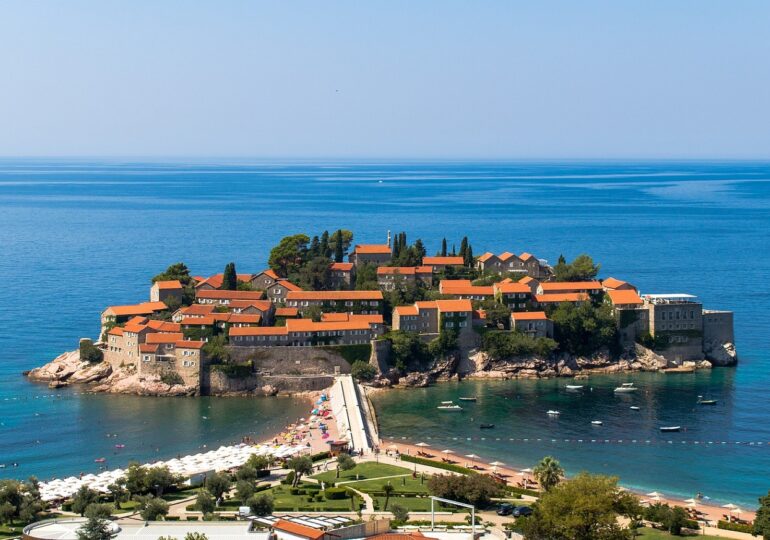Tens of thousands of Ukrainian and Russian exiled refugees have found refuge in a small Balkan country. The war brought them here and made them coexist to survive together.
Since February 2022, Ukrainian and Russian exiled refugees have spread across all corners of Europe, seeking to escape the war and Putin’s regime. Over four million people have left Ukraine, seeking protection in the European Union. However, outside the EU, Montenegro has received over 200,000 refugees, making it the country with the most Ukrainians per capita in the world, as reported by BBC.
Montenegro, a NATO member state and a candidate for EU accession, has not been without problems: it has a dense Serbian population, many of whom are pro-Russian sympathizers, and two years ago expelled six Russian diplomats on charges of espionage. Nevertheless, the small Balkan country is appreciated for how it responded to the refugee crisis, especially for the decision to offer Ukrainians temporary protection status extended until March 2025.
In these conditions, the Ukrainian community has taken root here: the latest data, from September last year, shows that over 10,000 Ukrainians have benefited from this support, and according to the UN, 62,000 Ukrainians have registered legally in Montenegro. That means almost 10% of the population of this country.
Montenegro is attractive for its visa-free regime, similar language, common religion, and Western-oriented government.
War refugees helped by Russian volunteers
However, there has been a strong presence of Russians in Montenegro for years, contributing to the reputation of this country as a haven for the wealthy. Many Russians and Ukrainians have come here through family ties or because they own properties here, but there is a large group of people who ended up in Montenegro simply by chance or hearsay and initially felt lost because they didn't know anyone.
For them, the non-profit organization Pristaniste (Paradise) was created. Based in the picturesque town of Budva on the Adriatic Sea coast, this NGO offers the most vulnerable newcomers a safe place and support for two weeks until they get on their feet and learn what to do.
They are provided with necessary documents, jobs, and housing, and Ukrainians can also come here for a "war vacation" after which they can return home if they wish.
In another location in Budva, Iulia Matsui has built a center for Ukrainians where they learn history, English, mathematics, and arts, but also dance, sing, or watch movies.
Now, most of the refugees are settled in Montenegro. Younger children have learned the language and attend local schools, while older ones have continued distance learning in Ukrainian schools.
Both charitable organizations have Russian volunteers, which has helped promote good relations between the Russian and Ukrainian communities here.
In other parts of Europe, occasional frictions have been recorded. Germany has seen an increase in attacks on Ukrainians and Russians. But in Montenegro such episodes have been isolated - there is a sense of tolerance here, and the organization Pristaniste and its volunteers have played a role in promoting it.
Sasha Borkov, a Ukrainian refugee and former driver in Kharkiv, distinguishes between the Russians he has met in Budva and those fighting in the war in Ukraine: "The people here are trying to help, they are not doing anything against our country, against us, against my children, unlike those who shoot and destroy our homes and claim they are liberating us."
Friendship relationships have been woven between volunteers and residents, and a Russian-Ukrainian couple who lived at the Pristaniste center recently got married.
Empathy plays a major role in strengthening the relationship between Ukrainians and Russians in Montenegro. When journalist Olha Musafirova from Kiev recently spoke in Budva about her work, the Russians in the audience had tears in their eyes, horrified by the actions of their country.
For Ukrainian actress Katarina Sinchillo, the Russian diaspora is different, and the one in Montenegro is a "sensitive" community. "I believe that the people living here are somewhat different, as they are the 'intelligentsia,' educated people who cannot live without art."
Regarding the former pro-Kremlin members of Russia's corrupt elite, whom Russian rock musician Mikhail Borzikin calls the "vatnaia diaspora," they remain calm in the properties they bought in Montenegro years ago.
Ukrainians want to go home, Russians are not in a hurry, even if they escape Putin
However, the warm welcome does not always reflect on the quality of life for refugees. Although there are plenty of job opportunities for immigrants in coastal areas, they are often seasonal and poorly paid. Quality and better-paid jobs are harder to come by. The luckiest Ukrainian refugees have managed to keep their jobs from home and work remotely.
Another difficulty is that it is almost impossible to obtain citizenship here, a major issue for those who, for whatever reason, cannot renew their passports.
The future of some immigrants remains uncertain. Most Ukrainians seem eager to return home if the war ends, assuming there is something left of their homes.
"Currently, there is a huge threat to our lives, but if it ends, of course, we will go home. Nowhere is better than home," says Borkov.
However, most Russians say that it will take much more than the fall of the Putin regime to convince them to return permanently to the country.
Natalia Sevet-Iermolina, who comes from the northern city of Petrozavodsk, says she is not in a rush. "The problem is not that Putin persecuted me, but those people with whom I lived in the same city. Putin is far away, but those who do his bidding will remain, even if he dies soon," she explains.
Even Borzikin does not believe he will return to Russia soon because it will take decades for mentalities to change. "Germany took 30 years (after Nazism), while new generations came. I am afraid I won't have that much time."
T.D.

